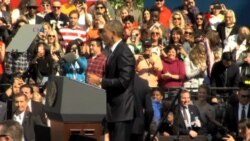President Obama visited a Nike shoe factory Friday in Oregon to promote controversial trade agreements that are intended to boost exports, but pit him against many of his usual allies in Congress and the labor movement.
Trade deal supporters say the agreements would give Washington an important role in setting trade rules, and help shape the future international economy. White House officials say "progressive" and "high-standard" trade agreements will help American companies export goods, which helps them prosper and hire people.
Nike says if Washington works out agreements with U.S. trade partners and gets them approved by Congress, the company will "accelerate" investment in advanced footwear manufacturing in the United States. The company says that could create 10,000 jobs over the next 10 years.
Critics of Nike say the firm gets many of its products from poorly-paid workers in Vietnam, and has laid off thousands of U.S. workers.
Changing economies
Economist Claude Barfield of the conservative American Enterprise Institute says the trade proposals deal with issues "central to the future of the worldwide digital economy and to U.S. competitiveness in that economy." He says U.S. officials want rules that ensure that goods and services "delivered electronically" get equal treatment with those delivered physically.
Washington also is seeking the lowest possible tariffs on such goods, and assurances that these goods will not be slowed by cross-border rules. Barfield says this is important because the evolving U.S. economy is creating more and more value in this relatively new area.
Economists say advanced economies previously evolved from focusing on agriculture to manufacturing, and have more recently been moving from manufacturing to services. Barfield says that evolution is continuing with a movement toward ever more high-tech services. He says the drastic decline in U.S. manufacturing jobs over the past couple of decades has more to do with these "secular, long-term changes" than trade deals.
Different view
Union official Thea Mei Lee strongly disagrees. The deputy chief of staff of the 12-million member AFL-CIO says previous trade deals prompted companies to move production and jobs overseas. She says that was a disaster for working families and hammered the U.S. middle class.
"U.S. trade policy for the last couple of decades has really failed," Lee said. "It failed to deliver good jobs at home; it failed to protect workers' rights abroad, and environmental standards."
These trade issues are at the center of a major political squabble in Congress. Both sides are running television commercials promoting their views. In some cases, trade issues are fodder for attack ads running in the home districts of members of Congress facing tough re-election fights.
The first issue is the Trade Promotion Authority, which would allow Congress to vote to approve or disapprove other trade deals, but would not allow lawmakers to make changes. Critics call it a foolish abdication of power by Congress, but supporters say U.S. trading partners are not going to put their best offer on the negotiating table if they think lawmakers are going to pick the deal apart later.
The next issue is the Trans-Pacific Partnership. Negotiations between the United States and 11 other Pacific nations of the TPP are said to be nearing completion. Talks are at an earlier stage in a proposed agreement between the United States and the European Union, called the Transatlantic Trade and Investment Partnership.









